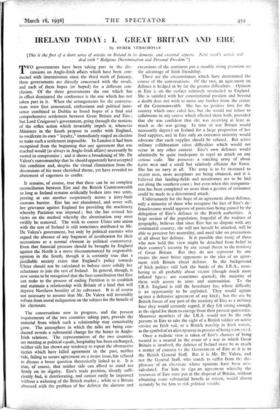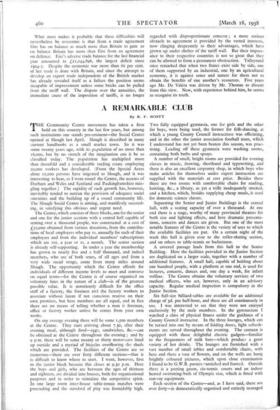IRELAND TODAY : I. GREAT BRITAIN AND EIRE
By DEREK VERSCHOYLE
This is the first of a short series of articles on Ireland in its domestic and external aspects. deal with " Religious DiscriMination and Personal Freedom "1 Next week's article will TWO governments have been taking part in the dis- cussions. on Anglo-Irish affairs which have been con- ducted with intermissions since the third week of January, three governments are directly concerned with the result, and each of them hopes (or hoped) for a different con- clusion. Of the three governments the one which has in effect dominated the conference is the one which has not taken part in it. When the arrangements for the conversa- tions were first announced, enthusiasm and political inno- cence combined in Dublin to breed hopes of a final and comprehensive settlement between Great Britain and Eire ; but Lord Craigavon's government, going through the motions of the reflex action which invariably impels it, whenever Ministers in the South propose to confer with England, to vociferate its own " loyalty," immediately staged an election to make such a settlement impossible. In London it had been recognised from the beginning that any agreement that was reached would (as always in Anglo-Irish affairs) necessarily be rooted in compromise ; and it shows a broadening of Mr. De Valera's statesmanship that he should apparently have accepted this condition and, despite the virtual elimination from the discussions of his most cherished theme, yet have revealed no abatement of eagerness to confer.
It remains, of course, true that there can be no complete reconciliation between Eire and the British Commonwealth so long as Ireland remains artificially broken into two units, peering at one another suspiciously across a jerry-built customs barrier. Eire has not abandoned, and never will, her grievance against England for providing the machinery whereby Partition was imposed ; but she has revised her views on the method whereby the abomination may most swiftly be removed. The wish to coerce Ulster into union with the rest of Ireland is still sometimes attributed to Mr. De Valera's government, but only by political enemies who regard the absence of any fragment of justification for their accusations as a normal element in political controversy. Even that financial pressure should be brought by England against the North is a move discountenanced by responsible opinion in the South, though it is certainly true that a justifiable anxiety exists that. England's policy towards Ulster should not be calculated to bolster more solidly her reluctance to join the rest of Ireland. In general, though, it now seems to be recognised that the best contribution that Eire can make to the process of ending Partition is to establish and maintain a relationship with Britain of a kind that will deprive Northern hostility of its substance. It is of course not necessary to assume that Mr. De Valera will invariably refrain from moral indignation on the subject for the benefit of his electorate.
The conversations now in progress, and the present requirements of the two countries taking part, provide the material from which such a relationship may conceivably grow. The atmosphere in which the talks are being con- ducted reveals a substantial change for the better in Anglo- Irish relations. The representatives of the two countries are meeting as political equals, hospitality has been exchanged, neither side has shown any tendency to repeat the obstructive tactics which have killed agreement in the past, neither side, failing to secure agreement on a major issue, has refused to discuss a lesser question theoretically linked to it. It is true, of course, that neither side can afford to stand too firmly on its dignity. Eire's trade position, already suffi- ciently bad, is deteriorating, and cannot easily be improved without a widening of the British market ; while to a Britain obsessed with the problem of her defence the alarums and excursions of the continent put a steadily rising premium on the advantage of Irish friendship.
These are the circumstances which have determined the course of the conversations. Of the two, an agreement on defence is hedged in by far the greater difficulties. Opinion . in Eire is on the surface relatively reconciled to England. She is satisfied with her constitutional position and beyond a doubt does not wish to move any further from the centre of the Commonwealth. She has no positive love for the country which once ruled her, but she would not refuse to collaborate in any course which affected them both, provided that she was confident that she was receiving at least as much as she was giving. In time of war Britain would necessarily depen I on Ireland for a large proportion of her food supplies, and in Eire only an extremist minority would advocate that such supplies should be refused. But active military collaboration raises difficulties which would not occur in any other context. Eire's own defences would admittedly be quite inadequate to repel an attack on any serious scale. She possesses a standing army of about 6,033 men and a small but relatively efficient Air Force. She has no navy at all. The army is to be increased to xo,000 men, more aeroplanes are being obtained, and it is believed that landing-fields and aerodromes are to be laid out along the southern coast ; but even when this reorganisa- tion has been completed no more than a gesture of resistance could be made to a determined attack.
Unfortunately for the hope of an agreement about defence, only a minority of those who recognise the fact of Eire's de- fencelessness would approve of protection being gained by the delegation of Eire's defence to the British authorities. A large section of the population, forgetful of the realities of geography, believes that since Eire has no dispute with any continental country, she will not herself be attacked, will be able to preserve her neutrality, and need take no precautions at all about her defence. It is possible that many of those who now hold this view might be detached from belief in their country's security by any actual threat to the territory of Great Britain. But they do not represent by any means the most bitter opponents to the idea of an agree- ment with Britain about defence. In the background of Irish politics still lurk the bands of the I.R.A., num- bering in all probably about xo,000 (though much more inflated figu: e; are sometimes quoted), the majority of them with access to arms and ammunition. To the I.R.A. England is still the hereditary foe, whose difficulty is an opportunity to be exploited. They would agitate ag iinst a defensive agreement of any kind ; but the use by British forces of any part of the territory of Eire as a military base they would certainly regard, if they felt strong enough, as the signal for them to emerge from their present quiescence. Moreover members of the I.R.A. would not be the only persons in Eire to take the sight of a British soldier on active service on Irish soil, or a British warship in Irish waters, as the symbol of an alien tyranny in process of being ?3sed.
Once a realistic view is taken of Eire's chances of being treated as a neutral in the event of a war in which Great Britain is involved, the defence of Ireland must be as much a matter of concern ta the Government of Eire as it is to the British General Staff. But it is Mr. De Valera, and not the General Staff, who stands to suffer from the dis- pleasure of an electorate whose opinions have been mis- calculated. For him to sign an agreement whereby the resources of Eire were put at the disposal of Britain, without obtaining some substantial benefit in return, would almost certainly be for him to risk political suicide. What most makes it probable that these difficulties will nevertheless be overcome is that from a trade agreement Eire has on balance as much more than Britain to gain as on balance Britain has more than Eire from an agreement on defence. Eire's adverse trade balance for the last financial year amounted to £21,044,896, the largest deficit since 1924-5. Despite the economic war more than 6o per cent. of her trade is clOne with Britain, and since the attempt to develop an export trade independent of the British market has already revealed itself as a failure the position seems incapable of improvement unless some bricks can be pulled from the tariff wall. The dispute over the annuities, the immediate cause of the imposition of tariffs, is no longer regarded with disproportionate .concerp ; a more serious obstacle to agreement is provided by the vested interests, now clinging desperately to their advantages, which have grown up' under shelter of the tariff wall. But their import- ance to their -respective countries is not so great that they can be alloWed to form a permanent obstruction. Talleyrand once remarked that when two States exist side by side, one of them supported by an industrial, one by an agricultural economy, it is against sense and nature for them not to obtain the benefits of one another's resources. Five years ago Mr. De Valera was driven by Mr. Thomas to dissent from this view. Now, with experience behind him, he seems to recognise its truth.















































 Previous page
Previous page